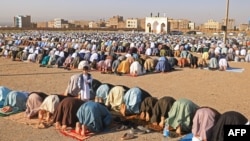The Taliban’s reclusive supreme leader ruled out any compromise Wednesday on his hardline Islamic governance in Afghanistan despite persistent global criticism and calls for him to end sweeping restrictions on women.
Hibatullah Akundzada addressed and led thousands of worshipers in Eid al-Fitr prayers at the central mosque in the southern city of Kandahar to mark the end of the Muslim fasting month of Ramadan.
“If anyone has any issues with us, we are open to resolving them, but we will never compromise on our principles or Islam. At the same time, we expect that Islam will not be disrespected,” stated Akhundzada in his defiant Pashto-language speech aired by the state-run Afghan radio station. "I will not take even a step away from the Islamic law."
Akundzada was apparently responding to sustained criticism by the United Nations and Western countries of the Taliban’s strict interpretation of Islam being used to govern impoverished Afghanistan, including the public flogging and stoning of women for committing adultery.
“I am administering God's Hudud. They object to it, saying public stoning and hand-cutting are against their laws and human rights. You expect us to follow your laws while imposing them on us,” Akhundzada said. “Islam is a divine religion that deserves respect, but you insult it instead,” he added.
According to the Islamic religion, Hudud is the set of laws and punishments specified by god in the Quran, the Muslim holy book.
Akhundzada said countries that participated in the United States-led military invasion of Afghanistan were still targeting his country with “propaganda” and "evil tactics” to malign Taliban rule.
“They blame your leaders, claiming they are incapable of governing the country. Don’t let these infidels mislead you,” he said. “Stay vigilant and be mindful of their deceitful tactics. Their ultimate goal is to see us fail.”
The Taliban leader has suspended girls' education in Afghanistan beyond the sixth grade and prohibited many women from public and private workplaces, including the United Nations and other aid organizations. Women are also forbidden from visiting public places such as parks, gyms, and bathhouses.
Akhundzada has defended his decrees, saying they are aligned with Afghan culture and Islam.
The Taliban returned to power in August 2021, when the then-internationally backed Afghan government collapsed, and U.S.-led Western nations withdrew all their troops after nearly 20 years of involvement in the war with the then-insurgent Taliban.
De facto Afghan authorities have since publicly flogged hundreds of men and women in sports stadiums in the presence of thousands of onlookers. The victims were convicted of offenses such as theft, robbery, adultery and other “moral crimes” by Taliban courts.
There is only one publicly available photograph of Akhundzada that the Taliban have officially used ever since he took command of the then-insurgent group in 2016.
Media representatives are not allowed to attend his public engagements, and even his followers are strictly forbidden from taking photos or filming him on their cell phones.
The Taliban leader rarely leaves Kandahar and rules the country from there.
The international community has not granted formal recognition to the men-only Taliban government, citing human rights concerns, especially the harsh treatment of Afghan women. Many Muslim-majority countries have also opposed the Taliban restrictions on women, saying that they are not based on Islamic principles.





